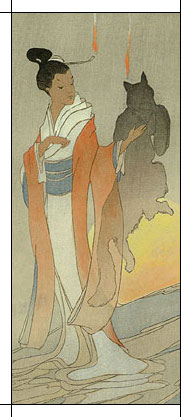
|
+ |
|
|
+ |
|
|
+ |
|
|
Western |
+ |
|
Vulpines |
+ |
|
+ |
|
|
+ |
|
|
That's not what they meant... |
+ |
|
Graves, roofs, and your own living room |
+ |
|
+ |
|
|
Where next? |
+ |
|
|
|

|
Matter or Spirit? It is rumoured that during mid-Kangxi times, a fire broke out at a shop selling melon seeds. (It was located south of the Main South Gate, and slightly to the east of it.) A sick youth could not escape from the house and was burnt along with it. When the fire was put out, people dug up the charred body, together with a fox who had joined him in death. It became clear then that the youth had fallen sick due to the fox's seduction. However, why the fox also died was not understandable. Some said, "The fox was strongly attached to him and, unable to save him, chose to stand by him." Others said, "The deities have struck the fox dead for seducing—and thus killing—a man." Neither is correct. Both foxes and ghosts can transform themselves, and ghosts can depart by penetrating the walls of houses. (That is what Luo Liangfeng said.) Ghosts have shape but no substance—they are pure qi. As qi can go anywhere, nothing can block them. Like dragons, foxes can become bigger or smaller, but with both substance and shape, they can shrink, but cannot disappear altogether. A fox can escape even through a crevice, but without a crevice there is no possibility of escaping. The most ingenious of foxes come and go by way of doors and windows. Before the youth died the fox had come to seduce him. All of a sudden the fire started, burning up the doors and windows, so the fox could not but be reduced to ashes as well. This 18th-century story appears in Ji Yun's Random Jottings at the Cottage of Close Scrutiny. Translation: Leo Tak-hung Chan, The Discourse on Foxes and Ghosts: Ji Yun and Eighteenth-Century Literati Storytelling. Honolulu: University of Hawai-i Press, 1998. P. 143. |